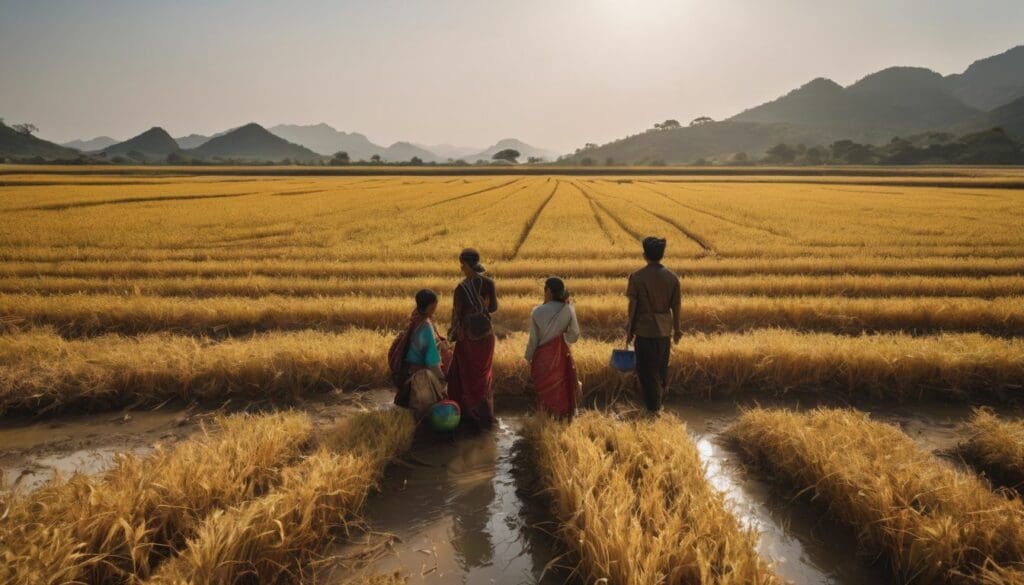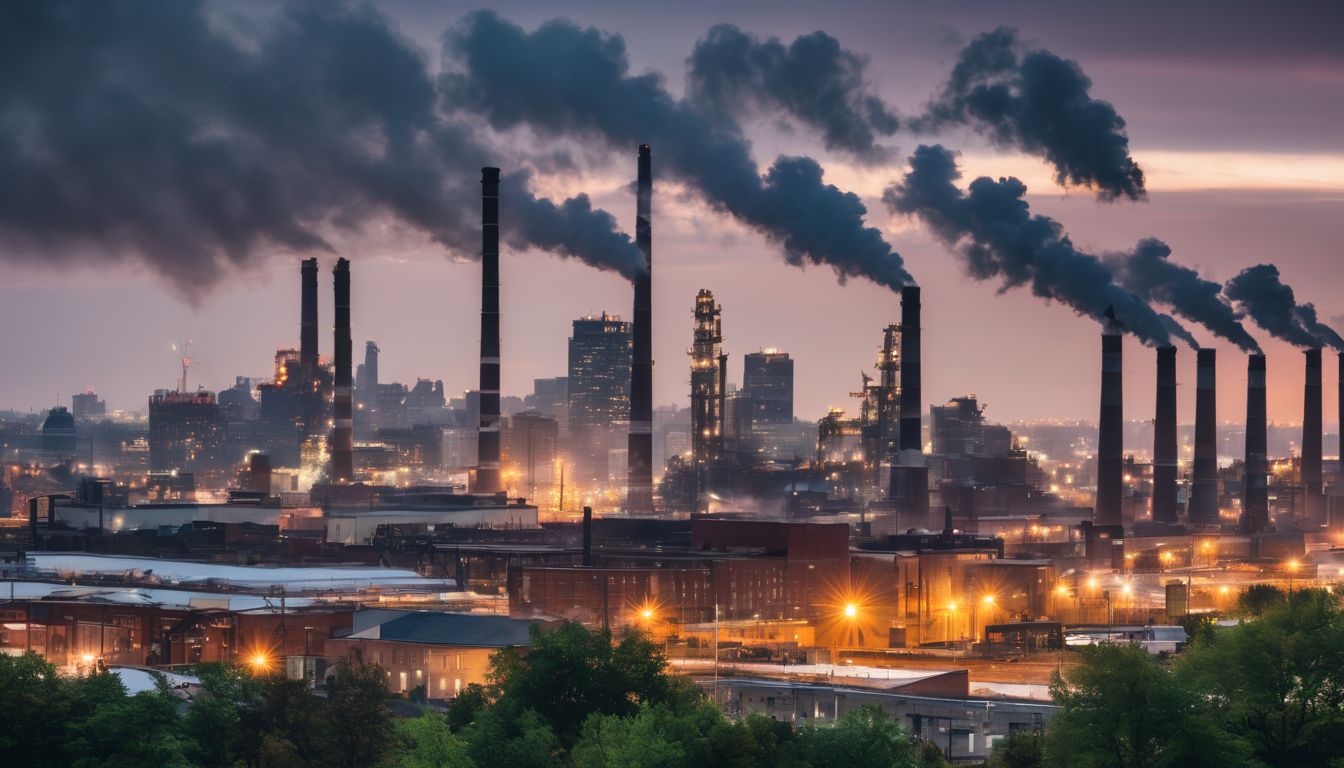Farmers across the globe are noticing unusual shifts in weather patterns, affecting their crops and livestock. Recent studies suggest that global warming could lower agricultural productivity by 17% in the next thirty years.
This article will explore how climate change influences farming and what we can do about it. It’s time to dig deeper into this hot topic!
Key Takeaways
- Global warming is set to reduce agricultural productivity by up to 17% within the next 30 years, affecting food security worldwide.
- Climate change causes extreme weather events like droughts and floods which disrupt farming operations and impact crop yields, as well as leading to soil degradation and water resource issues.
- Farmers are adopting strategies such as precision agriculture and crop diversification to cope with changing climates, ensuring stable farm income despite the challenges posed by global warming.
- Sustainable practices including agroforestry, cover crops, and efficient irrigation systems are being implemented to cut down greenhouse gas emissions from agriculture and enhance resilience against climate variability.
- Protecting agricultural workers’ health in harsh climate conditions is essential; this includes managing heat stress for livestock and promoting safer alternatives to hazardous chemicals.
Understanding the Link Between Climate Change and Agriculture
Climate change has a profound effect on agriculture, disrupting food production systems around the world. Rising temperatures and volatile weather patterns pose serious challenges to crops, with extremes in droughts and floods becoming more frequent.
Such climate variability can lead to lower crop yields, especially staples like maize and wheat that are sensitive to temperature changes. This not only impacts farmers but also threatens global food security.
Soil degradation is another major issue linked with climate change. As temperatures rise, soil moisture evaporates faster, making it harder for plants to grow without adequate water resources.
Meanwhile, carbon emissions from agricultural activities further exacerbate the greenhouse effect, creating a cycle of environmental impact that feeds back into affecting rural communities reliant on farming.
Tackling these issues requires sustainable agriculture practices that are resilient against a changing climate and can help mitigate further damage.
Top Climate Change Impacts on Agriculture
Climate change has led to changes in agricultural productivity, impacting the quality and quantity of crops grown. The effects also extend to soil and water resources, posing threats to the sustainability of farming operations.
Changes in Agricultural Productivity
Global warming is causing shifts in agricultural productivity, impacting food production and availability. Rising temperatures can lead to changes in the timing of planting and harvesting seasons, affecting crop yields.
Extreme weather events, such as droughts and floods, disrupt farming operations and reduce overall output. Additionally, the increased prevalence of pests and diseases due to changing climate conditions further compromise agricultural productivity.
Farmers are facing challenges in maintaining consistent levels of food production, jeopardising food security for communities worldwide.
In response to declining agricultural productivity caused by global warming, farmers are adopting climate-resilient practices. This includes implementing efficient irrigation systems to conserve water resources and utilising heat-tolerant crop varieties that are better suited to changing climate conditions.
Impacts to Soil and Water Resources
Climate change has significant impacts on soil and water resources. Rising temperatures and changes in precipitation patterns can lead to increased soil erosion, loss of soil fertility, and reduced water availability for agriculture.
These changes can affect crop yields and the quality of agricultural produce, ultimately impacting food security. Additionally, excessive rainfall or droughts can result in waterlogged soils or parched farmlands, further challenging farmers’ ability to sustainably manage their land.
Soil degradation also poses a threat to the environment as it affects the capacity of soils to sequester carbon and regulate greenhouse gas emissions. With these challenges in mind, adopting climate-resilient farming practices such as integrated crop-livestock systems and agroforestry becomes crucial for maintaining healthy soil structures and efficient water use.
Health Challenges for Agricultural Workers and Livestock
Adverse climate conditions can also pose health risks for agricultural workers and livestock. High temperatures contribute to heat-related illnesses, while exposure to pesticides and other chemicals poses a risk to the well-being of farmers and farm animals.
Additionally, changing weather patterns and extreme events like floods or droughts can impact the availability and quality of feed for livestock, affecting their overall health.
To address these challenges, it is essential to implement measures such as providing adequate protective gear for workers, promoting safer alternatives to hazardous chemicals, and developing resilient livestock management practices that account for changing climate conditions.
The Effects of Climate Change on Agriculture and the Economy
Climate change has led to crop and livestock losses, impacting farm income and the overall economy. To learn more about the implications of global warming on agriculture, keep reading.
Crop and Livestock Losses
Crop and livestock losses can be devastating for farmers, leading to financial strain and food shortages. Extreme weather events, such as droughts and floods, reduce crop yields and damage pastures.
This results in decreased agricultural productivity and lower income for farmers. Livestock are also at risk due to heat stress, water scarcity, and reduced forage availability. As a result, farmers face significant challenges in maintaining their livelihoods while ensuring food security for their communities.
Farmers must implement resilient agricultural practices to mitigate the impact of these losses on their livelihoods. Strategies such as diversifying crops or improving water management can help reduce vulnerability to climate-related risks like extreme temperatures and changing precipitation patterns.
Changes in Farm Income
Climate change has brought about significant fluctuations in farm income, impacting the livelihoods of farmers around the world. Unpredictable weather patterns and extreme events can lead to poor crop yields and livestock losses, causing a direct decline in farm income.
Additionally, rising production costs due to climate-related challenges further exacerbate financial strain on agricultural operations.
To mitigate these issues, it’s crucial for farmers to implement resilient strategies and adopt sustainable agricultural practices that can help safeguard their income against the adverse effects of climate change.
Addressing the Root of the Problem
Agriculture must adapt to the changing climate by reducing greenhouse gas emissions and improving resilience strategies – find out more about sustainable solutions for the future.
Reducing Greenhouse Gas Emissions from Agriculture
- Implementing agroforestry techniques to sequester carbon and increase biodiversity on farms.
- Utilising precision agriculture technologies to optimise inputs and reduce emissions from fertilisers and machinery.
- Integrating cover crops into crop rotations to improve soil health and sequester carbon.
- Adopting anaerobic digestion systems to convert agricultural waste into biogas for energy production.
- Promoting rotational grazing systems for livestock to minimise methane emissions.
Improving Resilience and Adaptation Strategies
To improve agricultural resilience and adaptation to climate change, farmers and policymakers can implement the following strategies:
- Implementing sustainable farming practices such as crop rotation and cover cropping to maintain soil health and fertility.
- Utilising drought – resistant crop varieties to mitigate the impact of water scarcity on food production.
- Investing in efficient irrigation systems to conserve water resources and ensure consistent crop yields.
- Promoting agroforestry techniques to enhance biodiversity, soil conservation, and carbon sequestration on farmlands.
- Enhancing early warning systems for extreme weather events to minimise agricultural losses and protect farmer livelihoods.
Conclusion and Call to Action
Understanding the link between climate change and agriculture is paramount. Climate change impacts agricultural productivity, soil, water resources and health of workers and livestock.
The effects of climate change on agriculture are far-reaching, affecting both crops/livestock losses and farm income. Addressing the root problem involves reducing greenhouse gas emissions from agriculture while improving resilience and adaptation strategies for a sustainable future.
FAQs
1. How does global warming influence agriculture?
Global warming affects agriculture by causing temperature rises that can lead to soil degradation and impact the overall food production.
2. What are farmers doing to adapt to climate change?
Farmers are adapting to climate change by using climate-resilient practices and sustainable agriculture techniques, helping ensure their crops can withstand changing conditions.
3. Can we reduce the impact of climate change on farming?
Yes, through implementing climate change mitigation strategies in farming, such as reducing greenhouse gas emissions, we can help agricultural resilience prosper even as the climate changes.
4. Is food security at risk because of global warming?
Food security is indeed challenged by global warming; however, with effective adaptation measures for climate variability in agriculture, communities can work towards safeguarding their food supplies.





